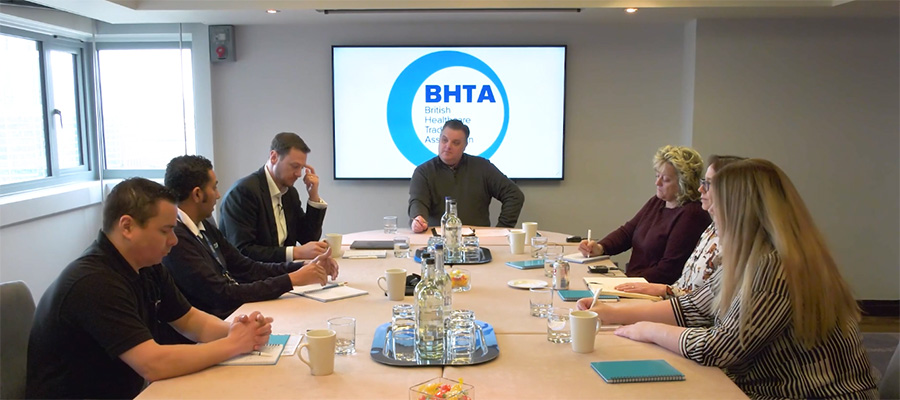Video: Panellists share their experiences of delivering virtual assessments for assistive technology during the pandemic

The fourth of a five-part webinar series exploring the topic of virtual assessments for assistive technology has been released, where clinical and industry leaders reflect on their experiences of delivering virtual assessments during the pandemic.
Delivered by the British Healthcare Trades Association (BHTA), the fourth webisode sees the panellists deep dive into what could have been done differently and why when doing virtual assessments for assistive technology, drawing on current knowledge.
Chaired by BHTA’s Head of Policy, Bill Lee, the panel consisted of Matthew James, Director of Precision Rehab; Rachel Russel, Senior Regional Advisor for Foundations UK; Clare Barber, Professional Services Manager at Disabled Living Foundation (DLF); Julie Blake, Senior Clinical Manager at NRS Healthcare; James Bennett, Sales and Marketing Director at Care & Independence; and Nash Kumar, Director at Higher Elevation.
This latest webisode follows the previous session, where the assistive technology panel debated whether the benefits of virtual assessments outweigh the drawbacks for users, companies, and professionals.
In the fourth webisode, James Bennett, Sales and Marketing Director at Care & Independence, would do virtual assessments differently now by including other key professionals in the process, like commissioners and lead clinicians.
He commented: “We went too early with the virtual stuff. We went too early, and we didn’t give it enough due diligence. So, if I were to do it again, I wouldn’t be hesitant about going out first, don’t mind being the first and don’t mind learning on the fly, but I would engage a lot more with the likes of the equipment providers, with the likes of maybe the lead clinician, decisionmakers, talking to commissioners, whatever it might be.
“And I’d engage a lot more to try and get a much more joined-up approach. It very much felt like we were imposing it. And the uptake was, as I said earlier, nothing.”
On the clinical side, Julie Blake, Senior Clinical Manager at NRS Healthcare, made an interesting point about ensuring occupational therapists (OTs) have the right IT skills in place to affect cultural change.
If she applied her current knowledge to when NRS Healthcare first started adopting virtual assessments for assistive technology, she would give her OT staff an IT kit from the beginning.
“I think what I’d want to do now is research the appropriate IT tools and software and say ‘This is the kit that would support our model’,” she explained. “I would want IT support as well. Occupational therapy is always missed out a little bit in terms of IT support, and the IT is put out there to serve other elements of the business. But we need some dedicated IT support. That will help us affect cultural change.”
Julie believes virtual assessments are here to stay and applying them properly is key.
Rachel Russel, Senior Regional Advisor for Foundations UK, reinforced Julie’s point around ensuring staff have the appropriate digital skills to effectively carry out virtual assessments for assistive technology.
Referring to current research and her own evidence base, she said: “Looking at the research that’s out there and what I’ve learned during this last 18 months is for it to work well, it’s around training and upskilling those digital skills. It’s around acceptance of technology both for the practitioners, yourselves [suppliers], and end-users.
“I think sometimes we think the end-user isn’t going to be accepting, but I think, like you’ve said, they’re probably going to be more accepting than the practitioners. What research said is that it works well when there’s an acceptance of the technology.”
Watch the full insightful fourth webisode below:

